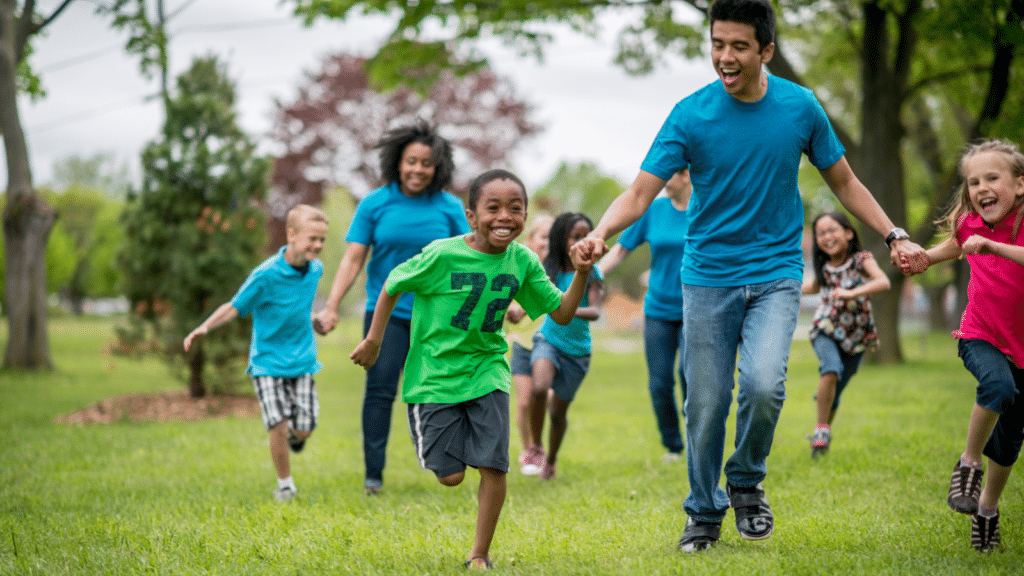Outdoor play is more than just a break from school or homework. It supports children’s health and development on all levels. Engaging in outdoor play not only promotes physical activity but also encourages social interaction and helps children form strong friendships, fostering their ability to connect with others in healthy and meaningful ways.
Read on to learn more about why outdoor play is key for children’s physical, cognitive, and social development.
Outdoor play helps kids stay healthy and active
Playing outside helps kids develop motor skills.
A study by the University of Jyväskylä in 2021 found young children living in the countryside and smaller cities spent more time playing outdoors than children living in more metropolitan areas. As a result, these children had better motor competence. Playing in nature and different weather conditions gave the children fun challenges to explore and overcome, helping them improve their body coordination, movement and fine motor skills. The difference in motor competence between children living in more rural areas and children living in more metropolitan areas underlines the importance of kids having opportunities to play outdoors.
Even cities can offer these opportunities at playgrounds and local parks. Adding exciting challenges and sensory experiences, such as an obstacle course, can give kids fun new challenges to explore, encouraging them to work on these motor skills. Through activities like climbing, running and jumping, kids can improve their coordination, balance and agility. The water-based elements in a splash park can also help children engage in physical movements like reaching, grasping and pouring, which further enhance their fine motor skills.
Developing these motor skills, both gross and fine, is essential for childrens’ growth, empowering them to learn and develop both physically and mentally. By boosting self-confidence, improving hand-eye coordination, enhancing balance and giving children a sense of their own abilities, motor development plays a significant role in shaping their overall well-being.
Play helps kids become better students
Recess is not a break from learning – rather, it helps children learn in new ways! Play encourages kids to explore their imagination and be creative, reducing their stress levels at the same time. This is beneficial for both the classroom and mental health. Playground equipment can help kids learn problem solving skills. For example, kids might have to figure out which rock to use next to scale the rock wall or how to climb a sculpture structure with no clear footholds.
Some equipment, like outdoor musical instruments, can even help students increase their memory, attention and concentration. Exploring music helps children enhance their ability to recognize and understand patterns. This can have a positive impact on their spatial-temporal skills, which can help improve their math and science skills. Playing with outdoor instruments might even spark a musical interest and uncover a hidden talent!
You can even combine learning and play with outdoor classrooms, which provide a fun and enriching experience with many interactive tools.
Outdoor play helps kids learn how to socialize
Play is a great tool for helping children navigate the intricacies of social interactions with ease. During early childhood when emotions can run high, play provides a safe and enjoyable space for children to understand, express and manage their feelings effectively.
Through activities like cooperative games and imaginative play, children develop essential social skills, such as empathy and perceptiveness. These skills lay the foundation for their long-term social growth. Embracing the power of play can help children flourish socially, teaching them to make meaningful connections and build important life skills.
Play helps promote inclusivity
Inclusive playgrounds can help foster a sense of belonging and enjoyment for all members of the community, regardless of their abilities. While not all play areas cater to every child, inclusive playgrounds ensure everyone can come together, have a blast and enjoy outdoor play in a welcoming environment. Inclusive play empowers children with disabilities by giving them the opportunity to join in the activities enjoyed by everyone. It also helps kids build friendships and embrace diversity in a fun new way.
You can improve playground accessibility by adding ramps, shade-providing structures, simple safety features, and soothing sensory areas like the Quiet Grove. Some kids have trouble processing all the sights and sounds at a busy playground and may get overwhelmed and get sensory overload. Having a quiet place to relax is an easy solution to help children alleviate stress without having to leave the playground.
Outdoor play benefits everyone
Outdoor play does not stop being important as we get older. Adults can use obstacle courses, outdoor fitness equipment and rock walls to help strengthen and refine their muscles while having fun. Spending time outside is amazing for mental health and can help both children and adults reduce their stress levels. Outdoor play areas are also hubs for socializing, providing a central location for communities to gather, hold events and interact with each other. This is why parks and community spaces are important for everyone, not just children.
Are you ready to invest in outdoor play for your community? Contact All Inclusive Rec to get started! You can also connect with a local representative by calling (573) 701-9787.
